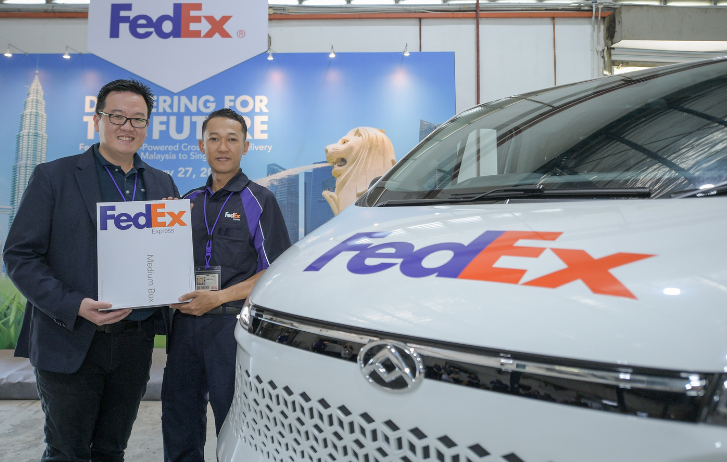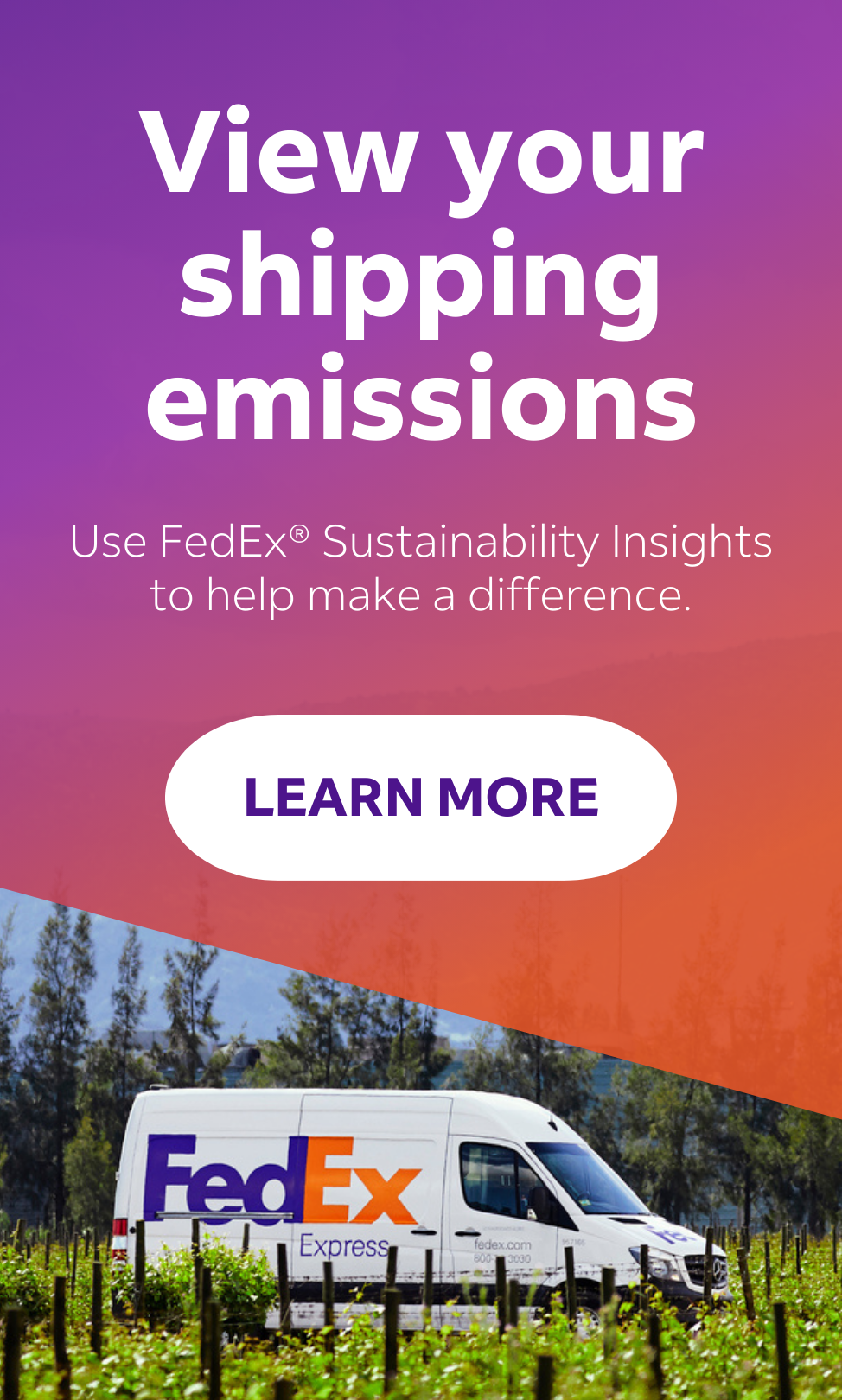
Why A Record-Breaking EV Delivery From Malaysia To Singapore Matters For Green Logistics
By Tien Long Woon | February 21, 2025
A package delivered from Malaysia to Singapore by EV on a single charge might just change the future of delivery. Data collected from the record-breaking journey can help make supply chains more sustainable in Asia Pacific and beyond.
- Malaysia’s logistics sector is using data-driven strategies to advance sustainability goals, optimize operations and minimize environmental impact.
- At FedEx, our focus is on the critical role of innovation, using data insights to drive greener practices.
- One example is our first-ever cross-border EV delivery from Malaysia to Singapore, which demonstrated how logistics companies can lead the way in building a sustainable future.
In today's dynamic business environment, sustainability commitments have become closely integrated into the core of business operations. Companies everywhere are looking for more innovative approaches to step up their sustainability efforts.
It’s a global shift indicating that when it comes to a company's societal responsibilities, profitability needs to be balanced with a more positive environmental impact.
In Malaysia, global sustainability trends are playing out via targeted initiatives to bolster the logistics sector's efforts. As a country, Malaysia is committed to curbing greenhouse gas emissions in proportion to its Gross Domestic Product (GDP) by 2030. The logistics sector plays a critical role in Malaysia's sustainability journey.
If successful, there is an opportunity for Malaysia to solidify its position as a leader in sustainable logistics practices in the region. In this context, the logistics industry emerges as a pivotal player, with scope to make a significant contribution to achieving broader environmental objectives.
Players in the logistics sector are investing their efforts in a number of ways, leveraging advanced technology to streamline supply chains more efficiently.
From optimization of pick-up and delivery routes to modernizing vehicles and shifting towards renewable energy, these efforts highlight our sector's commitment to science-based carbon emission reduction targets.
The role of data in driving sustainable logistics
Data plays a uniquely pivotal role in bolstering sustainability initiatives. It’s the cornerstone for strategic decision-making and operational enhancements. In the logistics sector, data-driven analysis helps reduce carbon emissions and supports the transition towards renewable energy.
At FedEx, we believe that the strategic application of data enables companies like ours to set a precedent. Applied properly, data can support businesses to develop sustainable initiatives in several critical areas:
1. Measurement and monitoring
Data allows businesses to measure their environmental impact with precision, providing benchmarks for improvement and tracking progress toward sustainability goals. This capability is crucial for companies aiming to establish transparent ESG reporting and showcase their commitment to reducing carbon footprint.
2. Identifying opportunities
Through data analysis, companies can uncover specific areas for sustainability enhancements, such as energy consumption, reducing waste and improving supply chain efficiencies. For instance, insights from operational data can guide businesses to transition to renewable energy sources or implement circular economy practices.
3. Optimizing resource use
Data facilitates smarter resource management by highlighting inefficiencies and recommending areas for improvement. This leads to cost savings, better allocation of materials and a reduced environmental footprint—benefits that resonate across industries, from manufacturing to retail.
4. Decision-making support
Data-driven insights empower leaders to make informed choices about suppliers, investments and product designs that align with sustainability objectives. For example, predictive analytics can help businesses anticipate environmental risks and adapt their strategies proactively, ensuring resilience in a rapidly evolving landscape.
5. Compliance and reporting
Accurate data collection also ensures that companies meet regulatory requirements and maintain compliance with global sustainability standards. By avoiding fines and reputational risks, businesses can focus on building trust with stakeholders and demonstrating accountability through comprehensive reporting practices.
6. Innovation and continuous improvement
Finally, harnessing data fuels the development of sustainable products, processes and business models. Companies can continuously refine their strategy, embracing cutting-edge technologies and creating solutions that set industry benchmarks and lead by example. This fosters long-term growth while addressing environmental challenges head-on.
By leveraging data-driven insights, businesses can track carbon output, identify improvement areas and set precise sustainability goals. This visibility helps meet carbon neutrality targets effectively. Throughout the project lifecycle, from assessment to outcome and evaluation, this strategic use of technology ensures continuous advancement toward a greener future.
First cross-border delivery EV trial from Malaysia to Singapore
FedEx launched the world’s first cross-border EV delivery from Malaysia to Singapore in 2024, marking a significant step toward advancing sustainable logistics. Covering a journey of 406km, the trial focused on collecting valuable data to better understand the opportunities and challenges of EV deployment in real-world conditions.
For example, the project highlighted the importance of understanding EV charging behavior, range efficiencies, and operational dynamics. Data revealed that slower speeds with optimized eco-modes improved energy consumption per kilometre, while factors like cargo load significantly influenced vehicle range. These insights are critical for businesses across industries as they explore adopting EVs or other sustainable transport solutions.
Beyond logistics, the trial demonstrated how leveraging real-time data and digital solutions can drive sustainability initiatives. By providing transparency into environmental metrics such as CO2 emissions and energy usage, businesses can make informed decisions that align with their sustainability goals.
This is particularly relevant for industries like manufacturing, retail, and consumer goods, which increasingly rely on data to optimize operations while meeting global environmental standards.
By remaining committed to collecting and sharing practical insights, the logistics sector can lead the way in building more sustainable futures. By using data to address challenges and refine strategies, industries in Malaysia and beyond can accelerate their transition to greener practices, contributing to national and global sustainability ambitions.
***
For more tips and insights on sustainable logistics, visit here.
SHARE THIS STORY
- How To Ship A Giant Panda
- How To Make Freight Shipments Work For Your Small Business
- The Rise Of Intra-Asia Trade: Opportunities In The China-Southeast Asia Corridor
- Southeast Asia's Role In Global Manufacturing Supply Chains
- 8 Most Unusual Shipments In The History Of FedEx
- Where Do Old Planes Go When They Retire?
Sign up now and save on your shipping rates!
Sign up now and earn discounts by shipping instantly with FedEx Ship ManagerTM at fedex.com.
Recommended For You

How To Get Greater Visibility Into Supply Chain Sustainability
FedEx Sustainability Insights helps businesses track emissions and measure logistics impact for more sustainable supply chain management.
Read More
How To Measure Impact For An Inclusive, Sustainable World
Economic, societal, and environmental impact: we call it the “FedEx Effect.”
Read More
The Evolution Of The Logistics Industry In Malaysia
With recent infrastructure investments and growth in e-commerce, Malaysia is becoming a strategic choice for businesses developing supply chains.
Read More

